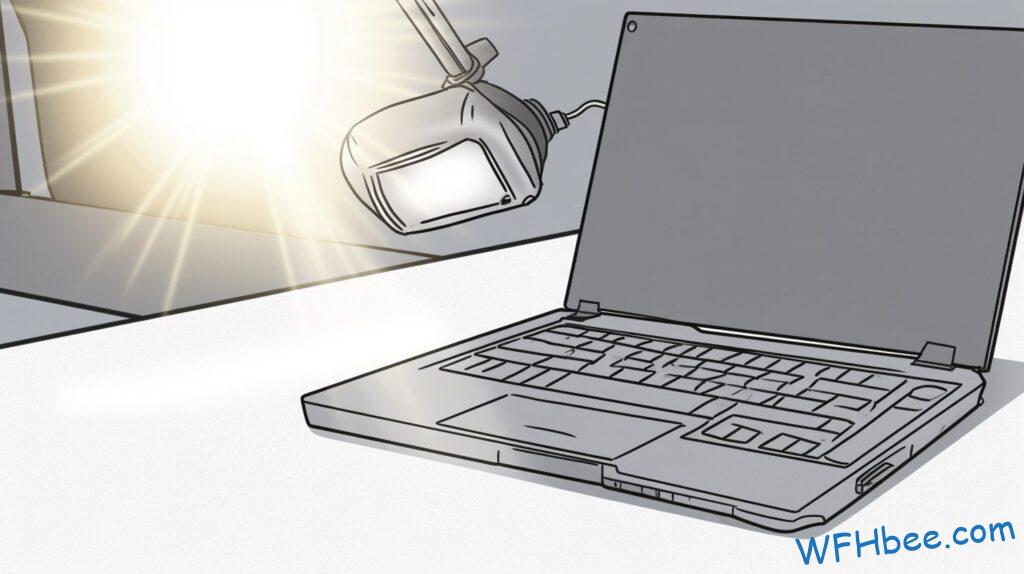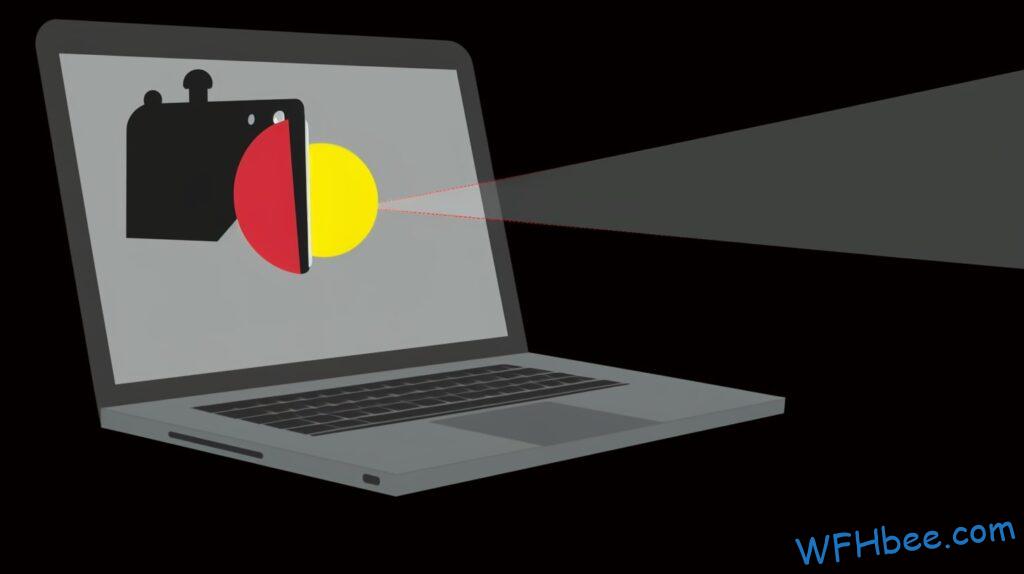Working from home can be a great way to save time, energy and money. With the rise of remote working opportunities, more people are taking advantage of their ability to work remotely. However, with this new freedom comes some potential risks for employers and employees alike…
Can an employer listen through your laptop when you’re working from home? It’s a question that many workers have been asking themselves since the emergence of remote work. After all, it would give employers unprecedented power over their staff – but is it even possible? In this article we’ll explore whether or not employers can really ‘listen in’ on their staff while they’re working away from the office.
We’ll look at what technology is available to employers, how these tools could potentially be used to eavesdrop on remote staff, and most importantly – how you can protect yourself against any unwanted monitoring if you do choose to take up a job that requires you to work from home. By reading this article, you’ll gain knowledge about the state of employer surveillance today – as well as peace-of-mind knowing that there are ways for employees to ensure their privacy remains intact!

Table of Contents

Definition Of Employer Monitoring
As the saying goes, “knowledge is power” – and employers are now more powerful than ever when it comes to monitoring their employees. Employer monitoring – also known as employer surveillance or workplace monitoring – entails collecting data on how an employee does their work, including any digital activity that takes place within a business environment. As technology advances, employees should be aware of the fact that many activities conducted in the office may be monitored from afar by their company. In other words, even if you’re working from home, your employer can still monitor what you do through your laptop. This raises questions about privacy rights for workers, which we will explore later on in this article. For now, let’s outline employers’ right to monitor their employees.

Employers’ Rights To Monitor Employees
Employers have the right to monitor employees, and this is especially true when it comes to remote work. In some cases, employers may be able to listen in on conversations or view activities through a laptop while an employee works from home. However, they must adhere to certain regulations that protect employee surveillance rights and data security practices.
It is important for employers to understand their legal obligations when monitoring employees remotely. These laws vary by state but generally include safeguards such as informing employees of any monitoring processes and providing them with access to their own records. Employers should also take steps to ensure that all data collected is secure and not used inappropriately. Furthermore, if an employer suspects misconduct during remote work hours, they are obligated to investigate and document the incident according to local policies before taking disciplinary action against the employee.
When it comes to filing complaints about workplace surveillance, there are various protections available for employees depending on where they live. For instance, some states offer specific remedies for those whose privacy has been violated due to excessive remote monitoring by their employer. Additionally, many companies provide internal grievance procedures for workers who feel like their rights have been violated due to unnecessary or unlawful surveillance at home or in the office environment.
Ultimately, understanding how far employers can go when attempting to monitor employees remotely helps build trust between management and staff while ensuring everyone’s safety and security in a virtual workspace. This knowledge allows both parties involved in a business relationship – the employer and the employee – to make informed decisions about safe working conditions that don’t compromise either side’s rights or duties under applicable law. Next we will explore the legality of employer surveillance further.

Legality Of Employer Surveillance
The previous section discussed employers’ rights to monitor employees, but what about the legal implications? Employer surveillance laws vary by state and country, making it important for both employers and employees to understand their respective rights.
When considering employee privacy rights legislation, workplace monitoring laws are perhaps most relevant in a remote work environment. Remote work regulations dictate that employers must obtain permission from an employee before they can access any of the worker’s electronic devices or accounts. This is especially true if the employer wishes to track keystrokes or take screenshots of activity on the device. The law also states that all information collected must be used solely for legitimate business purposes, such as assessing performance and productivity.
Additionally, many countries have enacted data protection laws which require companies to protect personal information collected through surveillance activities. These protections may include limiting how long this data is stored or who has access to it. It is paramount for businesses to stay compliant with these requirements in order to avoid costly fines or other penalties from government agencies tasked with enforcing them.
Moving forward, it is essential for workers and employers alike to know their rights when engaging in remote working arrangements – understanding applicable employer surveillance laws should help ensure everyone’s safety and security while upholding agreed-upon expectations between company leadership and its staff members. With this knowledge firmly established, we can now explore types of employee surveillance employed within the workplace today.

Types Of Employee Surveillance
Employers have a variety of ways to monitor their employees, whether they’re in the workplace or working remotely. Employee surveillance is an important way for employers to ensure that their workers are productive and compliant with company policies. There are several types of employee tracking that can be used to monitor activity both at work and from home.
The most common type of employee tracking is remote monitoring. This involves using software programs or other tools to track employee activities while they’re off site. Companies may use this kind of surveillance techniques to check on how long it takes employees to complete tasks, what websites they visit, and more. It can also be used as a form of security by allowing employers to see if any sensitive files were accessed without authorization.
Another type of workplace monitoring is called “big brother” tracking. This method uses sensors, cameras, and microphones to record conversations and movements within the office environment or even outside the building if needed. This type of monitoring allows employers to keep tabs on who enters certain areas and when, as well as who interacts with whom during meetings or other events held in the office.
These forms of employee surveillance allow companies access into aspects of their worker’s lives that would otherwise remain private; however, such practices pose potential risks for both employer and employee alike which should not be overlooked.

Potential Consequences Of Monitoring
As the use of employee surveillance continues to rise, so too does the potential for serious consequences. It’s no surprise that employers are increasingly using remote monitoring methods such as laptop listening devices and tracking software to monitor employees working from home. But what if you suspect your employer is secretly listening in on conversations or snooping through emails without your knowledge? What could be the long-term impacts of unauthorized surveillance?
The repercussions of employer monitoring can be severe. From an employee’s perspective, being unaware that they’re being tracked can lead to feelings of mistrust and violation of privacy. Tracking results may also affect job performance if it creates a sense of paranoia within an environment where trust should exist between colleagues and supervisors. Moreover, constantly having one’s activities monitored by their boss leads to stress, fatigue, low morale and decreased productivity – all resulting from feeling like there isn’t enough freedom to perform tasks adequately.
In addition, improper usage or mishandling of confidential work data can put companies at risk for legal action or financial penalties due to regulations like GDPR or HIPAA. As technological advances continue to improve both workplace efficiency and security issues arise simultaneously; employers must take caution when collecting sensitive information about staff members because it is not only unethical but illegal under certain circumstances. For this reason, many organizations have policies in place regarding how employee data is used and stored safely while still protecting the rights of individuals who are subject to monitoring practices.
Employers need to consider the short-term benefits versus long-term risks associated with different types of employee surveillance before implementing any new measures. Unauthorized monitoring has far-reaching implications that can create lasting damage and leave businesses open to legal action if ignored – even unintentional misuse of personal data carries significant penalties in some countries around the world. Understanding these potential consequences is essential for making informed decisions about workplace technology trends and ensuring ethical compliance across all levels of management.

How To Determine If You Are Being Monitored
Is your employer listening in on or monitoring you while you work from home? It’s a valid question, especially with the increase of remote working opportunities. Before jumping to conclusions, consider some tell-tale signs that may mean your employer is keeping tabs on what you do. Firstly, be aware of any security breach warnings coming up when using company devices and software. If this happens more than once it could indicate an effort by your employer to track employee activity. Secondly, look out for surveillance detection tools such as keyloggers installed on computers or servers. These programs record user data like emails and passwords which can then be monitored remotely. Lastly, familiarize yourself with workplace privacy rights and laws – if anything seems amiss contact HR immediately.
Employers have the right to monitor employee activity but should always inform them beforehand about their policies regarding remote tracking and monitoring practices. This allows employees to make informed choices about how they use their work laptop or other devices – ensuring everyone’s safety and privacy are respected at all times. Knowing these details helps protect both employers and employees from potential security issues or unwanted invasions of privacy. Understanding the implications of remote monitoring will help keep everyone secure whilst allowing for productive online collaboration during uncertain times ahead.

Tools For Remote Monitoring And Tracking
With the emergence of remote work, a whopping 90% of companies are now relying on employee monitoring tools to track their employees’ progress. The demand for home surveillance software and employee tracking technology has skyrocketed in recent years as employers seek to maximize productivity from their staff who are working remotely. This trend shows no signs of slowing down anytime soon.
Employee monitoring software is designed to ensure that workers remain productive during their remote hours by keeping tabs on how long they spend online and what programs they may be using at any given time. It can also help employers maintain a record of which tasks have been completed and when, thereby allowing them to organize better systems within their organization. Remote tracking technology further allows supervisors to quickly identify any issues or problems with an individual worker’s performance without having to physically go out into the field and investigate it themselves.
This type of surveillance raises many questions around privacy rights; however, there is still much debate over whether such methods constitute unauthorized spying or not. In either case, it’s important for both employers and employees alike to understand the legal implications involved before engaging in such activities. With this knowledge in mind, we can move onto exploring the various ways in which one might conduct unauthorized surveillance.

Unauthorized Surveillance
The previous section discussed tools for remote monitoring and tracking that employers use to keep track of their employees working from home. However, these same tools can be used for unauthorized surveillance purposes which are illegal in nature. Unauthorized surveillance is a serious privacy violation and any employer caught engaging in this activity could face legal action.
To protect against potential surveillance activities from an employer or other third party, it’s important to know what kind of detective measures you can take:
- Surveillance Detection: Stay alert for unusual behaviors such as sudden changes in schedule or strange visitors at your workplace.
- Keep Privacy Settings Tight: Keep all online accounts locked with strong passwords and two factor authentication enabled whenever possible.
- Secure Your Home Network: Make sure your network connection is secure by setting up wireless encryption protocols like WPA2 or VPN services when accessing the internet remotely.
- Update Antivirus & Firewalls: Install anti-virus software on computers and mobile devices connected to the internet and make sure they are frequently updated so they stay effective against malware threats.
- Monitor Activity Logs: Pay attention to activity logs associated with work devices such as laptops, phones, tablets etc., in order to detect any suspicious behavior or attempts at hacking into them.
It’s also essential to remember that cyber security isn’t just about protecting yourself from external threats but also guarding against internal ones – namely, overreaching employers who may try to access confidential information without permission through covert spying techniques like keylogging programs installed on employee hardware. If there is even the slightest suspicion of this type of activity occurring, then contact should be made immediately with an experienced attorney specializing in IT law compliance issues. By taking proactive steps now, workers can ensure that their rights remain protected while working from home.

Best Practices For Working From Home
Working from home has become increasingly popular in recent years, but it’s not without its challenges. As an employee, you need to be aware of your privacy rights and data security while working remotely. To ensure a secure work environment, here are some best practices for those who work from home:
First, familiarize yourself with the company’s policies regarding employee surveillance. Many companies have rules about what kind of monitoring is allowed when employees are working remotely. Make sure you understand these guidelines so that your employer doesn’t overstep their boundaries. Additionally, make sure to protect yourself by keeping all sensitive information on a secure device or platform that only you can access.
Second, create clear boundaries between personal and professional life while working from home. For example, take regular breaks throughout the day and establish designated areas in your home where you will do your work each day. This way, family members won’t accidentally interfere with important meetings or projects during business hours.
Finally, remember that remote work does come with certain protections for employees as well – such as the right to disconnect after business hours and the ability to schedule flexible hours when needed. Being mindful of these rights can help prevent any misunderstandings or conflicts related to expectations at work-from-home settings. With these tips in mind, you can stay productive and safe while enjoying the benefits of working remotely! Transitioning into this next section we’ll explore protections for employees in remote work settings

Protections For Employees In Remote Work Settings
Employees who work remotely have the right to privacy and security. It is important for employers to understand that there are certain protections in place when it comes to remote working surveillance, as well as how to ensure employee rights are upheld. Here’s a quick breakdown of what employees should be aware of:
- Remote work policies – Employees have the right to know their employer’s policy on data collection while they are working from home. They should also be aware of any monitoring tools or software being used by their employer.
- Data security – Employers must take reasonable steps to protect an employee’s personal data during remote work. This includes encrypting files and using secure networks whenever possible.
- Privacy expectations – An employee has the right to expect his/her private conversations will not be monitored without consent, except under special circumstances such as suspected misconduct or criminal activity.
The importance of understanding these protections cannot be understated; employees need assurance that their privacy will remain intact while they are working remotely, particularly if sensitive information is involved in the job duties. With this knowledge, workers can focus on completing tasks with confidence knowing their digital space remains free from unwanted intrusion or surveillance tactics. As we move into the next section about practical advice on keeping your data secure, remember—you deserve freedom and protection at every stage of your professional life!

Practical Advice On Keeping Your Data Secure
When working remotely, the first step is to understand how employers may be able to access your data. Fortunately, there are several safeguards you can take to protect your remote data security and ensure digital privacy protection. To begin with, make sure you have a secure connection while accessing corporate networks, such as using Virtual Private Networks (VPNs). VPNs help encrypt information transmitted between devices so that it’s harder for anyone else to intercept or read it. Additionally, use strong passwords and two-factor authentication whenever possible, as these will also add an extra layer of security when logging in and out of work accounts.
It’s also important to consider the physical security of any device used for remote work. Investing in quality hardware like updated laptops and tablets can help keep hackers away from company confidential files stored on them. For more sensitive information—such as documents containing employee personal details—you should look into using encrypted external storage drives or cloud services instead. This way, if a laptop gets stolen or compromised, only users with authorized access would be able to view those files.
Finally, staying up-to-date on best practices for securing remote work environments is essential for protecting yourself against unwanted surveillance. Regularly updating anti-virus software is one key measure; however, beyond this there are other steps you can take too: avoid opening suspicious emails or clicking strange links; never share passwords with third parties; educate yourself on cyber threats; and routinely delete unnecessary documents from computers. Taking all these precautions will go a long way towards helping keep your data safe!

Ways To Block Unwanted Surveillance
Picture a fortress with high walls and watchtowers. Now imagine that you are the ruler of this fortress, protecting it from any kind of surveillance or monitoring. This is how to think about ways to block unwanted surveillance when working from home.
There are many strategies people can use to prevent employer surveillance and avoid employee tracking. A firewall on your laptop or computer is one way to keep out unauthorized monitoring attempts. Security software such as anti-virus programs can also help protect against malicious attacks by cybercriminals who may be trying to access sensitive information in order to exploit it for their own gain. Furthermore, using secure networks like Virtual Private Networks (VPNs) can encrypt data while keeping private communications safe from prying eyes.
Finally, employers should establish clear policies around what is appropriate online behavior so employees know what levels of privacy they have when connected remotely to company systems or devices. Employees should also be aware of their rights under applicable laws; if an employer violates these laws, then individuals have recourse and legal options available for recourse. By taking steps to stop unauthorized monitoring practices, individuals can ensure that their work remains protected and confidential even when working away from the office environment.

How To Respond To Unauthorized Monitoring Practices
Employers have the right to monitor their employees, but it’s important for all workers to know and understand their rights regarding employee surveillance. Employees should be aware of what is and isn’t allowed in terms of monitoring practices so they can respond if something inappropriate occurs. It’s vital that employers remain mindful of employee privacy rights when it comes to tracking employees while they’re working from home or any other remote location.
The first step an employee can take when responding to unauthorized monitoring practices is to inform their employer about these issues. If the employer continues with such activities despite being informed, then the worker may need to move onto legal avenues like filing a complaint against them. In this situation, it’s best for the employee to look into their state’s laws on workplace surveillance and contact a lawyer who specializes in employment law if necessary.
It’s also recommended that employees keep records of any evidence related to potential violations as well as communication between themselves and their employer on the matter. The more information they can provide will help ensure that any claims are taken seriously and investigated properly. With proper documentation, an employee can better protect themselves and gain clarity on how they want to proceed towards resolving the issue at hand.
Taking action against an employer who has violated one’s privacy rights may seem daunting, but having access to relevant laws and resources can make this process smoother. Knowing that there are steps one can take gives individuals power over protecting their personal data from unwanted intrusion by those who seek misuse it for malicious purposes. Filing a complaint could be a viable solution for ending these invasive practices once and for all.

Filing A Complaint Against An Employer
With the increased use of technology, it has become easier for employers to monitor employee activity and conversations without prior notice or consent. As an employee, you have the right to file a complaint against your employer if you feel like your privacy rights are being violated by surveillance laws or other forms of monitoring.
When filing a complaint against your employer for unlawful surveillance, be sure to research applicable state and federal laws first. Depending on where you live, there may be specific statutes protecting employee privacy in the workplace. You should also seek advice from an attorney who is well-versed in labor law to ensure that all legal requirements are met when filing a claim against your employer.
At times, employers may not realize how intrusive or unethical their actions can be until someone brings attention to the matter. If you believe that your employer is violating your privacy rights through unfair practices such as laptop eavesdropping, it’s important that you take action. Reach out to attorneys specializing in employment law and relevant government agencies in order to get started with filing a complaint against your employer. This could potentially result in changes within the organization designed to protect employees’ privacy protections moving forward.
Take steps towards understanding what options are available so that you can make informed decisions regarding any potential complaints about employer monitoring activities at home and in the office.

Resources For Employees Regarding Privacy Rights
Employees concerned about their privacy rights while working from home need to know that they have resources available. Working remotely has put employee surveillance in the spotlight, and with good reason—employers can monitor employee activity on company-issued devices. Fortunately, there are ways to protect yourself if you believe your employer is listening through your laptop when you work from home.
First, it’s important to understand what rights an employee has under the law. In most cases, employers can’t listen directly into conversations or record video without consent. However, depending on the state you live in, employers may be able to track keystrokes and take screenshots of computer activity for training or evaluation purposes. Knowing these laws will help employees better protect themselves against unwanted surveillance.
Second, employees should familiarize themselves with data protection tools such as antivirus software and firewalls which can detect malicious intrusions and alert users of any suspicious activities. Additionally, encrypted messaging programs like Signal and WhatsApp provide secure communication channels so that only those involved in a conversation have access to its contents. Finally, organizations like the Electronic Frontier Foundation offer valuable information on digital privacy rights as well as guidance on how companies should handle data protection issues related to remote work arrangements.
With these resources at hand, employees have more control over their privacy while working from home than ever before. Even if employers are allowed by law to monitor certain aspects of workplace performance, employees still maintain basic privacy protections that must be respected by all parties involved. Taking advantage of existing legal protections coupled with technological safeguards will ensure maximum security for workers regardless of where the job takes place.

Final Words
In conclusion, employers have the right to monitor employee activity while at work. However, this monitoring should not be done in an intrusive or illegal way. Employees need to understand their rights and how they can protect themselves from unwanted surveillance.
It is important for employees to know that they are entitled to privacy when it comes to using company-issued technology and devices. They should also be aware of potential consequences for any violations of employer policies or other misconduct discovered through monitoring activities. Taking steps such as blocking access and filing a complaint with appropriate authorities can help ensure that employee privacy rights are respected.
No one should feel like their employer has unrestricted access into their personal life when working from home. It’s essential that both employers and employees alike understand the nuances of workplace surveillance so everyone feels empowered enough to take control of the situation if needed.
Author: Robin Borg
Hi, I’m Robin. I have been working from home at least one day a week during all of my adult life. I have a background in research and data science. Get to know me better in the About page.







